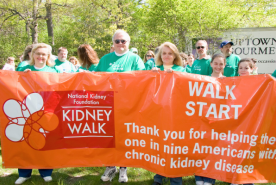Last updated: August 13, 2025
Medically reviewed by: NKF Patient Education Team
Depression affects many people on dialysis. Learn about symptoms, causes, coping strategies, and how to access support and treatment.
Table of Contents
- About Depression and Dialysis
- Why treating depression matters in dialysis care
- Why Depression Happens and How Treatment Helps
- Different Kinds of Depression in People on Dialysis
- Ways to Treat Depression When You’re on Dialysis
- How Well Depression Treatments Work for People on Dialysis
- Safety and Side Effects of Depression Treatments
- Additional considerations
- Questions for your healthcare team
- Additional Resources
About Depression and Dialysis
Depression is a health problem that affects your mood. It can make you feel sad, lose interest in things you enjoy, or feel hopeless. Many people on dialysis experience depression because living with kidney disease can be stressful and exhausting. If depression is not treated, it can make daily life harder, strain relationships, and even affect how well your dialysis treatment works.
The good news is that depression is treatable, and with the right support, most people feel better.
Why treating depression matters in dialysis care
Depression is not just about feeling sad, it can affect your physical health, your relationships, and how well you follow your treatment plan. For people on dialysis, untreated depression may lead to:
- Lower energy and motivation to attend treatments or follow dietary restrictions
- Poorer treatment outcomes, including more hospitalizations
- Strained relationships with family, friends, and caregivers
- Reduced quality of life, making daily activities harder to enjoy
When depression is recognized and treated, patients often experience:
- Improved mood and emotional well-being
- Sticking to schedule dialysis sessions and taking medications on time.
- Stronger coping skills to handle the challenges of kidney disease
- Greater confidence in managing their overall health
Talking about your feelings is an important part of your dialysis care. If you don’t share how you’re feeling with your healthcare provider, they won’t know how to help. By opening up, you can access treatments and support that improve your well-being. Getting help for depression is just as important as taking care of your physical health during dialysis.
Why Depression Happens and How Treatment Helps
Depression in dialysis patients can result from:
- Changes in the brain’s chemicals caused by chronic illness
- Fatigue, pain, and other physical symptoms
- Social isolation or loss of independence
Treatments may include counseling, medications, support groups, and lifestyle adjustments. These treatments work by balancing brain chemistry, building coping skills, reducing stress, and helping you feel supported.
Different Kinds of Depression in People on Dialysis
Common types of depression seen in dialysis patients include:
- Major depressive disorder
- Persistent sadness and loss of interest are lasting weeks of longer
- Persistent depressive disorder (dysthymia)
- Less severe but long-lasting symptoms
- Adjustment disorder with depression
- Emotional reaction to dialysis or illness-related changes
Ways to Treat Depression When You’re on Dialysis
There are several treatments that can help manage depression while you are on dialysis. Your care team will work with you to find the approach that fits your needs, lifestyle, and kidney health.
Counseling and Therapy
Talking with a mental health professional, such as a therapist or counselor, can help you understand your feelings and learn ways to cope.
- Cognitive Behavioral Therapy (CBT) is often used to treat depression. It focuses on changing negative thoughts and building healthy coping skills.
- Counseling can be done one-on-one, in groups, or even by phone or video.
- Many dialysis centers have social workers who can offer support or refer you to a therapist.
Support Groups and Peer Programs
Connecting with other people who are on dialysis can make a big difference. Sharing experiences, tips, and encouragement helps reduce feelings of isolation.
- The NKF Peers program offers one-on-one phone support from a trained peer mentor who understands what you are going through.
- Local support groups may also be available through your dialysis center or community organizations.
Lifestyle Approaches
Small daily changes can also improve mood:
- Staying active with gentle exercise (as approved by your doctor)
- Practicing relaxation techniques like deep breathing or mindfulness
- Keeping a regular sleep schedule
- Staying connected with friends and loved ones
Medications
Sometimes, antidepressant medications are recommended to help balance brain chemicals linked to mood.
- These medications can take a few weeks to start working.
- Your doctor may choose an antidepressant that is safe for your kidneys. Some may need smaller doses or extra monitoring.
- Common types include SSRIs (such as sertraline or citalopram) and SNRIs (such as duloxetine), which are often considered safe options with careful use.
- Not all antidepressants are safe for everyone on dialysis, so it is important to talk openly with your doctor about any side effects or concerns.
How Treatments Help
Treatment for depression, whether it’s therapy, support, lifestyle changes, or medication, works by:
- Improving brain chemistry
- Building coping skills
- Reducing stress
- Strengthening support systems
With the right treatment plan, many people on dialysis find they have more energy, better mood, and an improved outlook on life.
How Well Depression Treatments Work for People on Dialysis
Treatments for depression can be very helpful, especially when they are matched to your personal needs and health. Many people on dialysis who get help for depression report feeling better and find it easier to manage their care.
- Counseling and therapy often lead to better mood, improved coping skills, and less anxiety. Patients who participate in therapy may also find it easier to stick to their dialysis schedule and diet plan.
- Peer and group support helps reduce feelings of loneliness and provides encouragement from others who understand the challenges of dialysis.
- Medications can improve mood and energy, especially when combined with counseling. These medications need to be chosen carefully for people with kidney disease, but when monitored, they are often safe and effective.
Everyone responds to treatment differently. Some people feel better quickly, while others may need to try more than one approach before finding what works best. With the right support, most people see improvements in their emotional well-being and overall quality of life.
With the right combination of treatments, most people see improvements in their mood, energy, and quality of life.
Safety and Side Effects of Depression Treatments
Most treatments for depression are safe for people on dialysis when managed by your care team. However, it’s important to know what to expect and to share any concerns with your doctor.
Counseling and Support Programs
- These treatments have no medical side effects.
- Some people may feel uncomfortable at first talking about their emotions, but this usually improves over time.
- Sometimes finding the right therapist or connecting with one can be difficult.
- Therapy sessions can be scheduled around dialysis treatments to make them easier to attend.
Antidepressant Medications
- These medicines can cause mild side effects, such as nausea, headaches, changes in appetite or weight, or sleep problems.
- For people with kidney disease, some antidepressants need lower doses or extra monitoring to avoid buildup in the body.
- Your doctor will choose medications that are safe for your level of kidney function and adjust them if needed.
- Never stop taking an antidepressant suddenly without talking to your doctor, as this can cause withdrawal symptoms.
With careful monitoring, most people can safely use depression treatments and experience real benefits. Always let your care team know if you notice new or worsening symptoms while on any medication.
Additional considerations
Emotional self-awareness and self-care
Monitor your mood regularly. Ongoing sadness, irritability, or loss of interest may signal depression. Maintaining structure and routine by getting enough sleep, light exercise, and practicing relaxation techniques, can support emotional balance.
Social and peer support
Dialysis units often have social workers who can help identify depression and connect you to services. Peer support programs, including NKF Peers, can reduce isolation and help patients share experiences. Peer support can also motivate you to stay on treatment and give you someone to talk to who understands.
Questions for your healthcare team
- Could my medications or other health conditions be making my depression worse?
- What signs should I watch for that mean I need help right away?
- Are there antidepressants that are safe for someone with kidney disease?
- How long will it take before I start feeling better with treatment?
- Can my family or care partner be involved in my treatment plan?
- What should I do if I start having thoughts of hurting myself?
- What mental health services are available through my dialysis center or local community?








